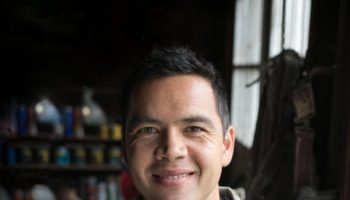
Lillian-Yvonne Bertram was 10 years old when they realized something crucial about language and words, something that would go on to shape their future in ways they couldn’t have predicted.
“When I learned about the effects writing could have on people, that words could make people feel a certain way and make them think certain things, I discovered this power — and realized I could harness it,” said Bertram, an author, educator and Week One poet-in-residence at the Chautauqua Writers’ Center. “I wanted to be the kind of writer who would make people feel things, and who communicated the kinds of things I wanted to communicate.”
Bertram eventually went on to dual major in creative writing and Hispanic Studies at Carnegie Mellon University, a school which Bertram said was focused on merging disciplines like the humanities, arts and technology in order to give students a more unique educational experience.
Because of this, Bertram became fascinated with the intersection of machines, machine learning and writing — a fascination which led them to write their latest book of poetry, influenced by open-source coding: Travesty Generator.
At 12:30 p.m. EDT Tuesday, June 30, on the Virtual Porch, Bertram — the recipient of a 2017 Harvard University Woodberry Poetry Room Creative Grant and a 2014 National Endowment for the Arts Poetry Fellowship — will give the first virtual Chautauqua Literary Arts Brown Bag lecture of the 2020 season, titled “A Pinchy Room: Homes for Black Likes in Poems by Gwendolyn Brooks.” The craft talk will complement the workshops Bertram is leading this week by centering the use of location and social spaces in the poetry of Brooks, one of Bertram’s “all-time favorite authors.”
“Brooks had a really long and varied career,” they said. “What I really admire about her is how much her work changed over time.”
To Bertram, one of the most important aspects of Brooks’ writing was the way it responded to the social conditions of her time.
“She was the first African American to win the Pulitzer Prize for Poetry back in 1950,” they said. “As social movements came and went, her writing changed. She was a writer who was very much embedded in her community and her commitments, and her writing showed that. She never thought to divorce her writing from the things going on in the world.”
Keeping an author’s work current with social concerns is one of many pieces of advice Bertram said they have for attendees of their lecture, and for young authors in general.
“Young people today are so much braver than I ever was,” they said. “They have so many more opportunities and outlets for writing and sharing their work than I did. It sounds super cliché, but it’s important that they not back down from their writing, and to believe in it.”
Though Bertram said they think young people already have that kind of courage, to them, an author’s willingness to take risks is one of the most important qualities that they can internalize.
“It works,” Bertram said. “Taking risks, putting yourself out there — it works.”




